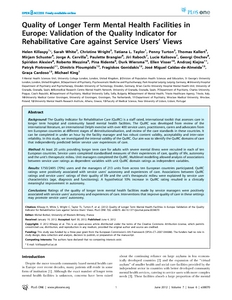Killaspy, H;
White, S;
Wright, C;
Taylor, TL;
Turton, P;
Kallert, T;
Schuster, M;
Cervilla, JA;
Brangier, P;
Raboch, J;
et al.
Killaspy, H; White, S; Wright, C; Taylor, TL; Turton, P; Kallert, T; Schuster, M; Cervilla, JA; Brangier, P; Raboch, J; Kalisova, L; Onchev, G; Alexiev, S; Mezzina, R; Ridente, P; Wiersma, D; Visser, E; Kiejna, A; Piotrowski, P; Ploumpidis, D; Gonidakis, F; Caldas-de-Almeida, JM; Cardoso, G; King, M
(2012)
Quality of longer term mental health facilities in Europe: validation of the quality indicator for rehabilitative care against service users' views.
PLoS One, 7 (6).
e38070.
ISSN 1932-6203
https://doi.org/10.1371/journal.pone.0038070
SGUL Authors: White, Sarah Jane Wright, Christine
![[img]](https://openaccess.sgul.ac.uk/107350/1.hassmallThumbnailVersion/Quality_longer_term_mental_health_facilities_Europe_validation_quality_indicator.pdf)  Preview |
|
["document_typename_application/pdf; charset=binary" not defined]
Published Version
Download (98kB)
| Preview
|
Abstract
BACKGROUND: The Quality Indicator for Rehabilitative Care (QuIRC) is a staff rated, international toolkit that assesses care in longer term hospital and community based mental health facilities. The QuIRC was developed from review of the international literature, an international Delphi exercise with over 400 service users, practitioners, carers and advocates from ten European countries at different stages of deinstitutionalisation, and review of the care standards in these countries. It can be completed in under an hour by the facility manager and has robust content validity, acceptability and inter-rater reliability. In this study, we investigated the internal validity of the QuIRC. Our aim was to identify the QuIRC domains of care that independently predicted better service user experiences of care.
METHOD: At least 20 units providing longer term care for adults with severe mental illness were recruited in each of ten European countries. Service users completed standardised measures of their experiences of care, quality of life, autonomy and the unit's therapeutic milieu. Unit managers completed the QuIRC. Multilevel modelling allowed analysis of associations between service user ratings as dependent variables with unit QuIRC domain ratings as independent variables.
RESULTS: 1750/2495 (70%) users and the managers of 213 units from across ten European countries participated. QuIRC ratings were positively associated with service users' autonomy and experiences of care. Associations between QuIRC ratings and service users' ratings of their quality of life and the unit's therapeutic milieu were explained by service user characteristics (age, diagnosis and functioning). A hypothetical 10% increase in QuIRC rating resulted in a clinically meaningful improvement in autonomy.
CONCLUSIONS: Ratings of the quality of longer term mental health facilities made by service managers were positively associated with service users' autonomy and experiences of care. Interventions that improve quality of care in these settings may promote service users' autonomy.
| Item Type: |
Article
|
| Additional Information: |
© 2012 Killaspy et al. This is an open-access article distributed under the terms of the Creative Commons Attribution License, which permits unrestricted use, distribution, and reproduction in any medium, provided the original author and source are credited. |
| Keywords: |
Adolescent, Adult, Aged, Aged, 80 and over, Europe, Female, Health Facilities, Humans, Long-Term Care, Male, Mental Disorders, Mental Health Services, Middle Aged, Quality Indicators, Health Care, Reproducibility of Results, Young Adult, Science & Technology, Multidisciplinary Sciences, Science & Technology - Other Topics, COMMUNITY, INSTITUTIONAL CARE, SCALE, SCHIZOPHRENIA, CONSEQUENCES, PEOPLE, General Science & Technology, MD Multidisciplinary |
| SGUL Research Institute / Research Centre: |
Academic Structure > Population Health Research Institute (INPH) |
| Journal or Publication Title: |
PLoS One |
| ISSN: |
1932-6203 |
| Language: |
eng |
| PubMed ID: |
22675508 |
| Web of Science ID: |
WOS:000305341700036 |
| Dates: |
| Date |
Event |
| 2012-06-04 |
Published |
|
 |
Go to PubMed abstract |
| URI: |
https://openaccess.sgul.ac.uk/id/eprint/107350 |
| Publisher's version: |
https://doi.org/10.1371/journal.pone.0038070 |
Statistics
Item downloaded times since 04 Mar 2015.
Actions (login required)
 |
Edit Item |



